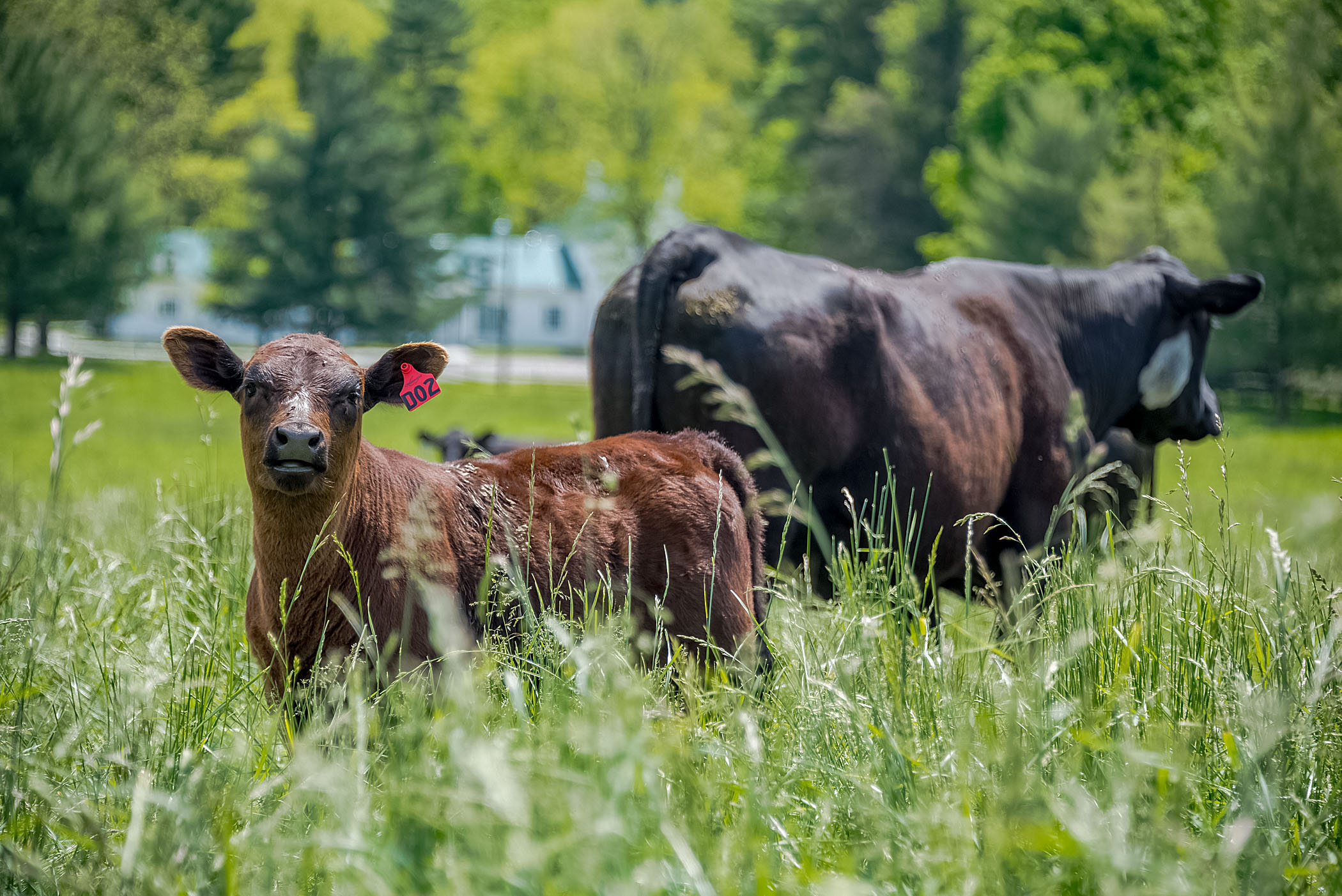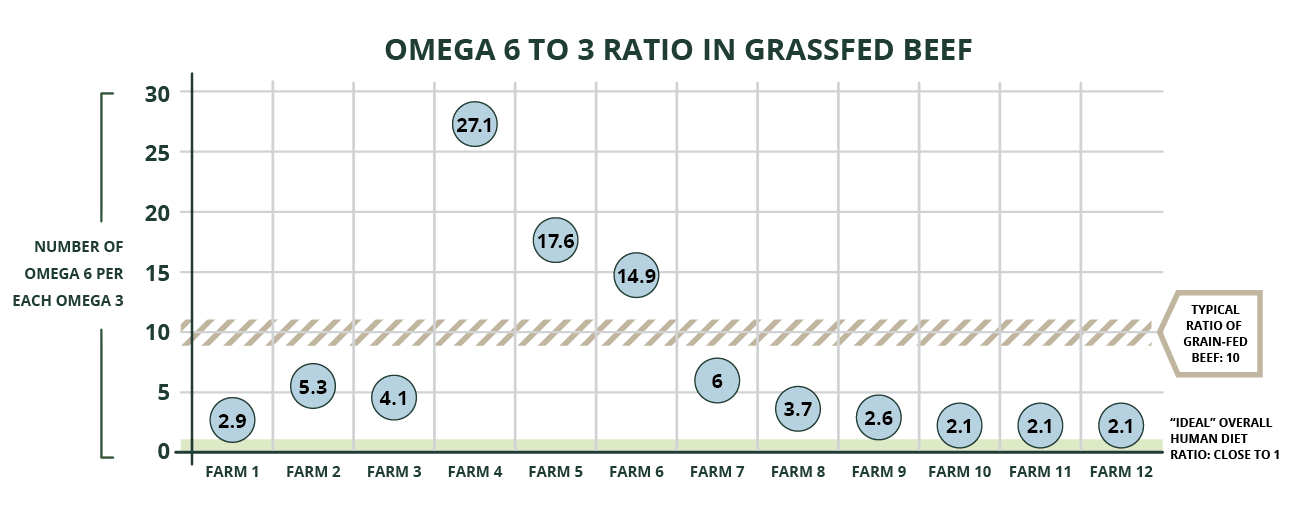Variation in the Nutritional Quality
of Grass-fed Beef in the United States
Overview
Agricultural production systems can vary greatly from the regional level down to the farm level potentially leading to products that are inconsistent with consumer expectations. This project sought to determine if the variability in production methods, season, forage diversity, supplementary feedstuffs and other factors could lead to variation in nutritional profiles of grass-fed beef across a representative sample of the United States supply chain. To better understand the impact of these varying production practices, 750 samples of beef labeled as “grass-fed” were collected from sub-regions of the United States. Samples were analyzed for nutritional differences to help consumers, ranchers, and farmers understand the impact that variations in production practices, season, and other factors may have on the quality of grass-fed products.

Consumer Expectations
Consumer interest in their food source, its environmental footprint, and the impact of diet on health has helped spur the growth of the grass-fed beef industry. The perception is that grass-beef comes with higher standards for animal welfare, more environmentally friendly production practices, and perceived health benefits from a more favorable fatty acid and antioxidant composition, when compared to grain-fed beef. Studies have concluded that grass-fed beef has distinct nutritional differences from conventionally-finished beef, however many consumers are unaware of the large variation in beef production practices falling under a “grass-fed” label claim. As demand for grass-fed beef products continues to grow, it is vital to continue to explore the nutritional complexities and variation in the product so that consumers are getting the product they expect.
Research Approach
In 2016 Greenacres partnered with Dr. Jason Rowntree and Michigan State University (MSU) on a 2-year project in an attempt to identify the amount of nutritional variability in US beef products labeled as “grass-fed”. To accomplish this goal, we performed nutritional analysis on grass-fed samples from participating farms and ranches from across the United States grass-fed beef supply chain. Samples were collected from 12 producers across 10 states (GA, IA, MT, NE, NV, OH, OK, OR, TX, WI), representing a variety of grass-fed beef production practices. Seven hundred and fifty grass-fed beef striploin samples were collected at the harvest facility. Participating farmers/ranchers filled out an online survey detailing their production practices, including forage type, supplemental feedstuffs (e.g. hay, baleage, soybean hulls, etc.), and grazing practices, among others. The samples were sent to MSU where they underwent laboratory analysis for fatty acid profile, vitamin A and vitamin E content, and mineral composition. These results were linked to the corresponding producer surveys. Nutritional outcomes were then able to be tied back to production practices to examine correlations between production and nutritional outcomes.
Results

The following excerpt came from the published paper A Nutritional Survey of Commercially Available Grass-Finished Beef in Meat and Muscle BiologyTM, the official Journal of the American Meat Science Association.
This survey of commercially available grass-fed beef indicates that producers use a wide variety of feeding strategies to finish cattle, including fresh and harvested forages, and both annual forage crops and perennial pastures. The diversity of production strategies mirrors the variability in the nutritional profile of the beef.
Beef sampled for this study contained greater proportions of monounsaturated fatty acids and polyunsaturated fatty acids to total fatty acids than has been previously reported for grass-fed beef. The Omega 6 Omega 3 ratio was numerically lower in beef from producers who indicated finishing cattle solely on fresh forages compared to beef from producers who finished cattle on harvested feeds. Similarly, the content of α-tocopherol and β-carotene was greater in beef from producers who reported finishing on fresh forages. Mineral content was highly variable, reflecting the diversity in forages fed and locations where forages were grown.
This survey serves to gain a greater understanding of the trends and variation among grass-fed beef produced in the United States of America and marketed to consumers. The results of the survey encouraged Greenacres to look more deeply into how different grassfed feeding regimens impact the nutritive value of beef, and additional studies are underway.
Collaborators

Greenacres Foundation Research Department
Founded in 2015, the Research Department at Greenacres Foundation explores connections between agricultural practices and outcomes on soil health, food quality, and the environment. The data collected through our research efforts helps inform consumers and producers about healthier, more sustainable farming practices and allows us to make better management decisions. Learn more at https://green-acres.org/research/

Department of Animal Science at Michigan State University
The Department of Animal Science creates, advances and extends knowledge benefiting humans, animals, food production agriculture, sustainable systems management, the environment, and our stakeholders. Learn more at https://www.canr.msu.edu/ans/index
Researchers

Chad Bitler
Research Director, Greenacres Foundation
Chad leads the Greenacres Research Department with a goal to explore connections between regenerative agricultural practices, responsible ecological management, and their outcomes on soil health, food quality, and the environment – which are all inextricably linked. The data collected from Greenacres research is aimed at inspiring land managers to instill regenerative practices that can provide positive impacts on their land. Chad graduated from University of Cincinnati with a M.S. in Nutritional Sciences. He has collaborated on research with notable land grant universities and organizations to help increase the collective knowledge surrounding regenerative practices.

Dr. Jason Rowntree
C.S. Mott Professor of Sustainable Agriculture, Department of Animal Science
Jason Rowntree is a professor of Animal Science at Michigan State University where he holds the Charles Stewart Mott Distinguished Professorship for Sustainable Agriculture. He also serves as the Director of MSU’s Center for Regenerative Agriculture. Rowntree’s research focus is identifying the metrics and management that reflect ecological improvement in grazing land systems. He conducts this work at Lake City AgBio Research Center where he also maintains coordinator responsibilities. Since arriving to MSU in 2009, Rowntree has given over 250 talks throughout the United States, Canada, Europe, Saudi Arabia, Africa and New Zealand. He has also worked to co-develop, with the Savory Institute, an Ecological Outcome Verification that is now being used on over 2 M acres of grasslands on every continent except Antarctica. The EOV has also been branded for products marketed by General Mills, Applegate, Timberland and many others. He is the project director of a new $19.2 M funded project entitled, “Metrics, Management, and Monitoring: An Investigation of Pasture and Rangeland Soil Health and its Drivers”. His work in beef sustainability has been featured in the movie Sacred Cow, The Washington Post, New York Times, Forbes and many other popular media publications.
Research Updates
Contact Us
Department Director
Chad Bitler



